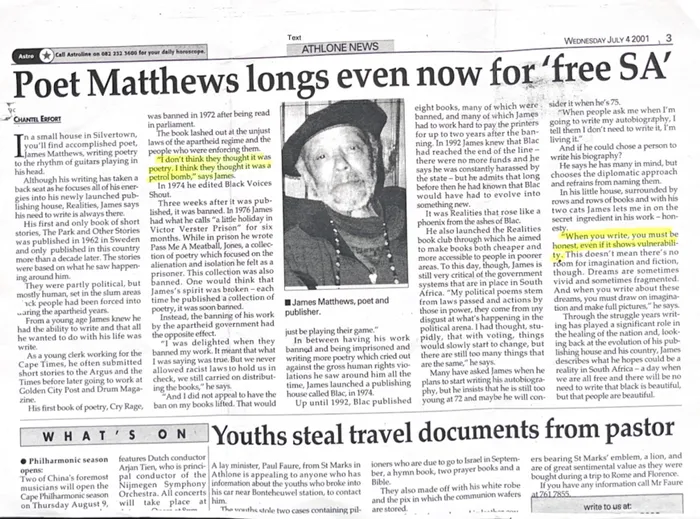‘I think they thought my poetry was a petrol bomb’

One of my earliest assignments as Athlone News reporter was an interview with acclaimed poet James Matthews who lived in Silvertown.
As a young Athlone News reporter in 2001, I was sent to interview writer James Matthews at his Silvertown home. Around that time, I’d also been involved in the local poetry scene, and since that meeting, “Uncle James” and I remained in contact. Ten years after that meeting, I was invited to speak at his 82nd birthday celebrations at Centre for the Book. His death at the weekend - peacefully in bed, at home, at the age of 95 - prompted me to unfold a copy of the speech I delivered on 25 May 2011, four days before his birthday...
“I don't think they thought it was poetry. I think they thought it was a petrol bomb.”
This was how James Matthews described his poetry the first time I met him.
It was in 2001. I had just started working as a reporter at the Athlone News and had been sent out to interview him about the release of his anthology, Flames and Flowers, and the launch of his publishing house, Realities.
Although none of his work had been prescribed when I was at school, one of my teachers, a very politically aware and active woman, had introduced us to his work and the importance of the work of artists in the struggle against Apartheid and oppression.
And so, by the time I got to meet the man himself, I was fairly familiar with his work and had developed great respect for him.
Still, I had no idea what to expect.
The night before the interview, I spent hours reading Flames and Flowers and preparing the questions I'd ask.
But I was in for a rude awakening.
And I expect many who know Uncle James have had similar experiences - and maybe have even come to expect that from every encounter with him.
As an aside, I must explain that I'm not James Matthews's niece.
Uncomfortable calling an elder by his first name, I started calling him Uncle James - and was bluntly reminded that he, in fact, was not my uncle...
Anyway, on the day of the interview, formalities and introductions had barely been exchanged when Uncle James said to me: "I'm not a new kid on the block. Ok. I've been around. And have you read any of my work? Don't waste my time if you haven’t
WOW.
I suppose it was VERY lucky for me that I had read his work.
But then there I was.
Put in my place.
And totally thrown off balance for the rest of the interview.
About halfway through, I needed a breather. And so I asked if I could escape to ... I mean use ... the toilet. Uncle James said yes. But then I asked where it was, and he replied sharply: “You obviously haven't been in a council house before.”
And there it was.
My first encounter with Uncle James's uncanny ability to see the bullshit.
And call it.
A spade is a spade. And he calls it as such.
And today, apart from wishing him a very happy birthday, I'd like to thank him for, through his work and forthright nature, being an inspiration to see beyond the fluff and superficial exteriors, and to express things as they truly are.
In his writing, James Matthews is unafraid. Whether he is writing about oppression. Incarceration. Or getting older.
And that should inspire all of us, particularly the writers among us.
Too often we try to couch things in pretty prose or magnificent metaphors when, really, what we ought to be doing is exposing the injustice.
Drawing attention to the realities.
Being honest.
And sincere.
Too often we merely speak about speaking our truth, but never actually do it.
In that first interview I conducted with James Matthews, I recall him saying: “When you write, you must be honest. Even if it shows vulnerability.”
That, I can tell you, is often easier said than done.
I vividly remember the sting of having one of my poems, written and performed in honour of James Matthews, mocked by an ... uhm... art critic. Shattered, I spoke to Uncle James about it, desperate to know what I had done wrong, and how he felt about it.
He gave me a simple piece of advice: “F*** him. He's an idiot.”
And so, Uncle James, I want to thank you for that gem.
And I want to thank you for being a writer who is brave enough to be honest.
A writer who is not afraid to point out the fickle and the superficial.
Thank you for seeing injustice and highlighting it.
And for writing the stories many others were afraid to.
And oh.
Happy birthday!
Now I wish you a peaceful rest, dear poet.
Chantel Erfort now serves as editor-in-chief of Africa Community Media which publishes Athlone News and a number of other community titles around the country.
Related Topics: